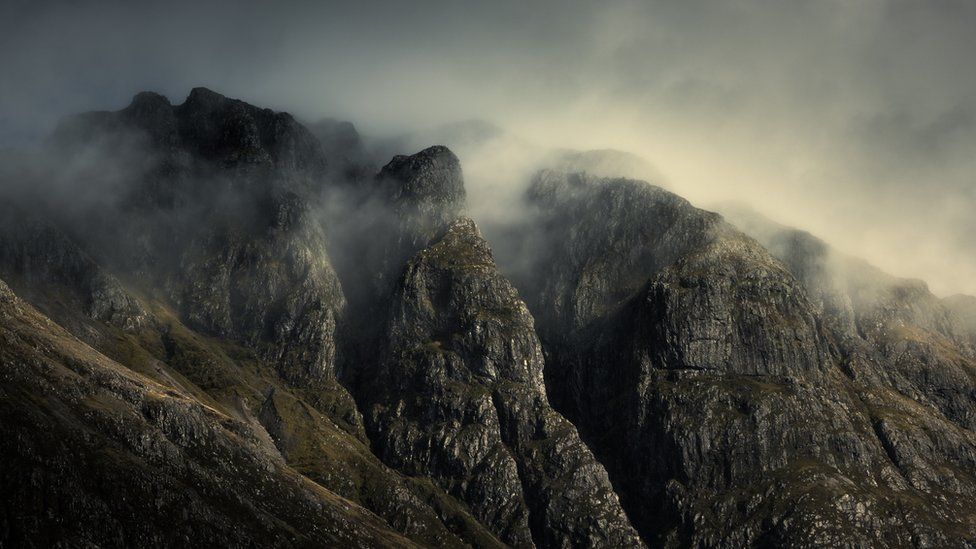
The ridge in Glen Coe is popular with climbers
Three climbers have been found dead after failing to return from a trip into Glen Coe.
Police Scotland said the bodies of two men and a woman were discovered during a search of Aonach Eagach, a ridge popular with climbers.
A spokeswoman confirmed the alarm was raised shortly after 21:05 on Saturday.
An initial search involving Inverness coastguard helicopter was made in mist and fog in difficult terrain, before the bodies were found on Sunday.
Library drone footage captures the Aonach Eagach Ridge in Glen Coe (March 2022)
Police said Glencoe and RAF mountain rescue teams also assisted with the search and recovery operation.
The police spokeswoman added: “There do not appear to be any suspicious circumstances. A report will be submitted to the procurator fiscal.”
The coastguard said it was alerted at 22:50 on Saturday, and its Inverness search and rescue helicopter assisted in a search of the ridge.
A spokeswoman said a coastguard helicopter from Prestwick provided further support to police and mountain rescue teams on Sunday morning.
Image source, Stephen Gillespie
A coastguard helicopter in Glen Coe on Sunday
Kate Forbes, SNP MSP for MSP for Skye, Lochaber and Badenoch, described the deaths as “horrendous news”.
She said: “My thoughts are with the families. My sincere appreciation to mountain rescue, as always, and the emergency services.”
Angus MacDonald, a local Highland councillor who grew up in the Clachaig Inn below the ridge, said: “This is a tragedy for those who died and their families.
“I know everyone in the area will feel for them.”
Image source, Getty Images
The high, narrow, exposed ridge runs almost the length of Glen Coe and links two summits – 953m (3,127ft) Meall Dearg and 967m (3,172ft) Sgòrr nam Fiannaidh.
Its name means “notched ridge”, a reference to its jagged, rocky terrain.
Traversing – crossing – Aonach Eagach involves about six miles (9km) and can take up to nine hours to complete, according to mountaineering guides.
Much of the route involves scrambling – a mountaineering term meaning climbers using their hands to help keep their balance on steep, difficult terrain.
The ridge is popular with keen and experienced climbers and many traverse Aonach Eagach safely every year.
But it has been the site of fatalities, and recent previous deaths in the area have included a 63-year-old woman in September 2014 and a 44-year-old man in July 2016.
Last September, the body of Alan Taylor, from Dundee, was found in a gully near the ridge. The 57-year-old had been missing since September 2021.
‘Families’ grief’
David Whalley, a veteran mountaineer and former RAF mountain rescue team leader known in the climbing community by his nickname “Heavy”, said conditions could change quickly on Aonach Eagach.
He told BBC radio’s Good Morning Scotland programme: “It is one of the best ridges in Scotland. It’s a wonderful thing and I have done it quite a few times, and done quite a few rescues on it.
“There are a few tricky bits, with greasy rocks. The weather is always changing – one minute it is clear and the next the mist is down.
“The big problem is if it all goes wrong there are very few places to get off, so you have to keep going or go back the way you came.”
Mr Whalley added: “We mustn’t forget we are talking about people and grief going on in (families’) lives.”
“Mountaineering is wonderful but it is a risk sport and we all live with that when we are out in the mountains.”
Mr Whalley also paid tribute to Glencoe Mountain Rescue Team.
“The Glencoe is an extremely professional team with a great history,” he said.
“They are unpaid volunteers and have to go back to work the next day, but someone has to do it and they do a wonderful job.”

